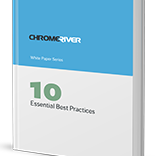 Editor’s note: This article is the first in a four-part series on reporting travel and entertainment expenses.
Editor’s note: This article is the first in a four-part series on reporting travel and entertainment expenses.
Like many employees, Jennifer often drives her own car on business trips—10,000 miles over the past year. Since her employer reimburses her at the standard mileage rate (55½ cents per mile), she had $5,550 added on to her paycheck over the course of the year. When tax time comes around, however, Jennifer realizes that the $5,550 is included on her W-2 as taxable wages. The situation seems unfair, but she’s unsure what to do about it.
According to IRS Publication 463, “Travel, Entertainment, Gift and Car Expenses,” employers have the option of providing tax-exempt reimbursement for mileage and other common expenses by following specific accounting rules. Using expense management software like Chrome River EXPENSE can make following these rules easier for both the employer and employee.
If Jennifer’s company treated her $5,550 as paid under an IRS “accountable plan,” it would not show up as wages on her W-2, and she would not owe taxes on that amount. Instead, the company would deduct the expense on its own corporate tax return.
This type of expense reimbursement is considered a “fringe benefit,” according to Marianne Couch, principal of Cokala Tax Information Reporting Solutions. Other common fringe benefits include health insurance and retirement plans. Depending on each employee’s situation, an accountable plan could simplify tax filing or even reduce their tax liability.
While an accountable plan offers benefits, it has additional requirements. Expenses must have a clear business connection. Generally, employees must submit receipts or other documentation for expenses over $75 and return any excess reimbursement or allowance within a reasonable timeframe.
Here are four best practices for reporting expenses under an IRS accountable plan.
- For each expense, document the amount spent, the time and the place. Providing employees with online expense reporting tools helps them maintain accurate records of receipts, cash expenses and mileage.
- Identify the business purpose of each expense. Online expense reporting also helps with tracking these details (like the names of people at lunch meetings and the topic of discussion), along with receipts and mileage records.
- Check for excess allowance or overpayment. Expense management software can facilitate ongoing compliance checks, helping managers catch discrepancies as they arise.
- Ensure excess allowance is returned in a timely fashion. Managers can use expense analytics to generate reports of overdue amounts and identify such problematic patterns as business centers or individuals who repeatedly receive excess allowance.
An accountable plan can benefit your organization and its employees, and expense management software can help streamline reporting and ensure compliance with IRS rules. For more tips, watch for the rest of our four-part series on how to report travel and entertainment expenses.
Source: IRS.gov, Institute of Finance and Management webinar
Subscribe
Latest Posts
Posts by Category
I just love the Chrome River application. I could probably sell it! Finance Administrative Coordinator Law Firm, 800 Employees
Can’t we just move year-end, so that we can roll out Chrome River sooner!? Financial Systems Director Law Firm, 300 Employees


Comments